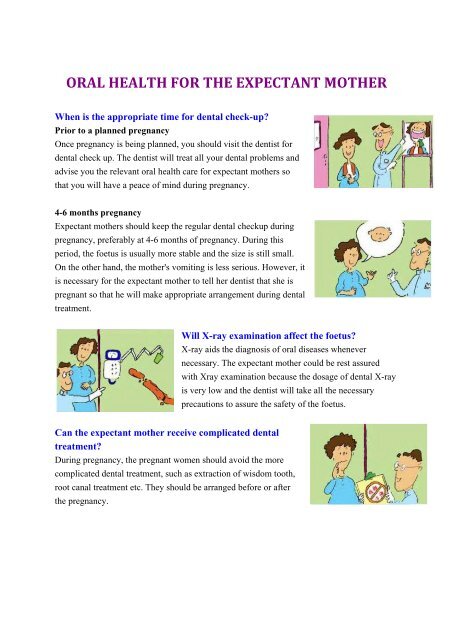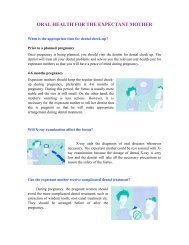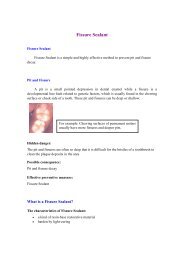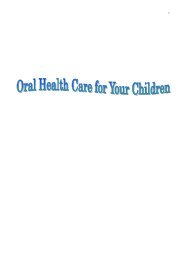Oral Health for the Expectant Mother (Leaflet) (PDF)
Oral Health for the Expectant Mother (Leaflet) (PDF)
Oral Health for the Expectant Mother (Leaflet) (PDF)
You also want an ePaper? Increase the reach of your titles
YUMPU automatically turns print PDFs into web optimized ePapers that Google loves.
ORAL HEALTH FOR THE EXPECTANT MOTHER<br />
When is <strong>the</strong> appropriate time <strong>for</strong> dental check-up?<br />
Prior to a planned pregnancy<br />
Once pregnancy is being planned, you should visit <strong>the</strong> dentist <strong>for</strong><br />
dental check up. The dentist will treat all your dental problems and<br />
advise you <strong>the</strong> relevant oral health care <strong>for</strong> expectant mo<strong>the</strong>rs so<br />
that you will have a peace of mind during pregnancy.<br />
4-6 months pregnancy<br />
<strong>Expectant</strong> mo<strong>the</strong>rs should keep <strong>the</strong> regular dental checkup during<br />
pregnancy, preferably at 4-6 months of pregnancy. During this<br />
period, <strong>the</strong> foetus is usually more stable and <strong>the</strong> size is still small.<br />
On <strong>the</strong> o<strong>the</strong>r hand, <strong>the</strong> mo<strong>the</strong>r's vomiting is less serious. However, it<br />
is necessary <strong>for</strong> <strong>the</strong> expectant mo<strong>the</strong>r to tell her dentist that she is<br />
pregnant so that he will make appropriate arrangement during dental<br />
treatment.<br />
Will X-ray examination affect <strong>the</strong> foetus?<br />
X-ray aids <strong>the</strong> diagnosis of oral diseases whenever<br />
necessary. The expectant mo<strong>the</strong>r could be rest assured<br />
with Xray examination because <strong>the</strong> dosage of dental X-ray<br />
is very low and <strong>the</strong> dentist will take all <strong>the</strong> necessary<br />
precautions to assure <strong>the</strong> safety of <strong>the</strong> foetus.<br />
Can <strong>the</strong> expectant mo<strong>the</strong>r receive complicated dental<br />
treatment?<br />
During pregnancy, <strong>the</strong> pregnant women should avoid <strong>the</strong> more<br />
complicated dental treatment, such as extraction of wisdom tooth,<br />
root canal treatment etc. They should be arranged be<strong>for</strong>e or after<br />
<strong>the</strong> pregnancy.
What are <strong>the</strong> changes in <strong>the</strong> oral health condition of <strong>the</strong><br />
expectant mo<strong>the</strong>r and how to take care of her oral health?<br />
Hormonal changes<br />
The hormonal changes during pregnancy will cause an exaggerated<br />
reaction of <strong>the</strong> gums to <strong>the</strong> toxins secreted by <strong>the</strong> dental plaque<br />
bacteria. The gums will become red and swollen and bleed easily.<br />
This phenomenon is called "Pregnancy Gingivitis". To prevent it,<br />
<strong>the</strong> expectant mo<strong>the</strong>r should remove dental plaque adequately by<br />
toothbrushing so as to maintain good oral health.<br />
Craving <strong>for</strong> sweet and sour food<br />
Pregnant women may crave <strong>for</strong> sweet and sour food during<br />
pregnancy. However, bacteria in plaque will make use of <strong>the</strong><br />
dietary sugar to produce acid and cause tooth decay. Moreover,<br />
minerals in <strong>the</strong> teeth may also be washed away by acidic food,<br />
thus reducing <strong>the</strong> thickness of <strong>the</strong> enamel.<br />
In order to protect her teeth, <strong>the</strong> expectant mo<strong>the</strong>r should use fluoridated toothpaste <strong>for</strong><br />
toothbrushing. It is because fluoride can:<br />
1. help repair <strong>the</strong> early tooth decay<br />
2. streng<strong>the</strong>n <strong>the</strong> enamel, making it more resistant to acid attack<br />
3. prohibit <strong>the</strong> activities of <strong>the</strong> plaque bacteria so as to reduce<br />
<strong>the</strong> acid production by plaque<br />
If <strong>the</strong> expectant mo<strong>the</strong>r craves <strong>for</strong> food, she should seek <strong>the</strong><br />
dentist's advice concerning <strong>the</strong> effective ways of protecting her<br />
teeth, which may include <strong>the</strong> use of fluoridated mouthwash to<br />
resist <strong>the</strong> acid attack by dental plaque.<br />
Will tetracycline affect <strong>the</strong> foetus?<br />
From <strong>the</strong> 4-6 months of pregnancy, <strong>the</strong> deciduous dentition of <strong>the</strong><br />
foetus begins to <strong>for</strong>m. There<strong>for</strong>e, <strong>the</strong> intake of tetracycline, an<br />
antibiotic, by <strong>the</strong> expectant mo<strong>the</strong>r may lead to <strong>the</strong> deposition of<br />
tetracycline in <strong>the</strong> deciduous teeth, resulting in <strong>the</strong> teeth turning<br />
yellowish-brown or bluish-grey in colour. However, <strong>the</strong> discoloration<br />
depends on <strong>the</strong> type, duration and dosage of <strong>the</strong> tetracycline taken.<br />
Thus, it is necessary <strong>for</strong> <strong>the</strong> expectant mo<strong>the</strong>r to tell her doctor that<br />
she is pregnant so that he will prescribe medication appropriately.

















